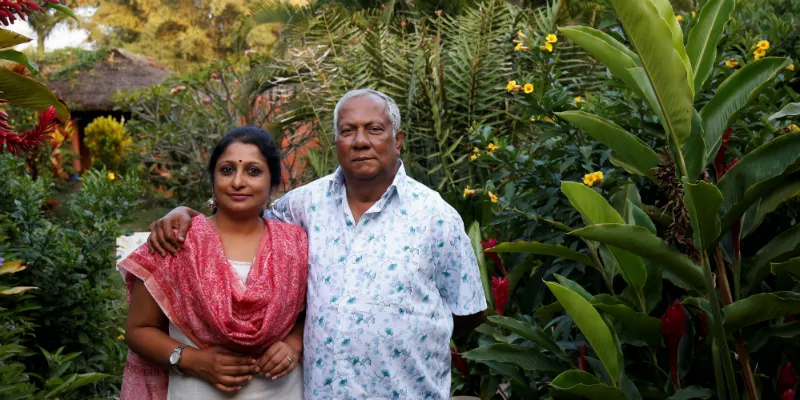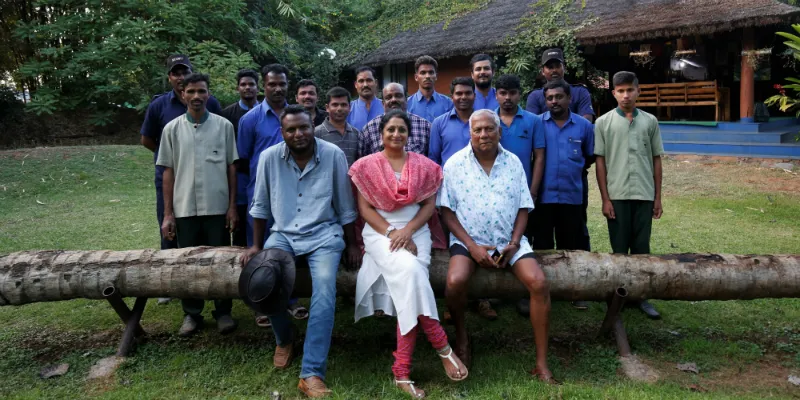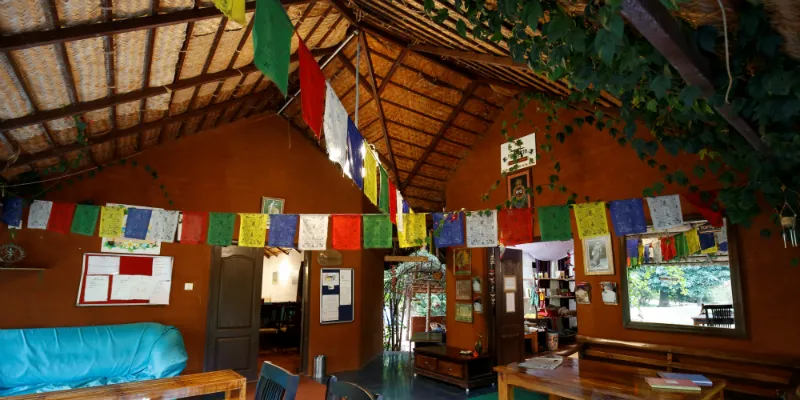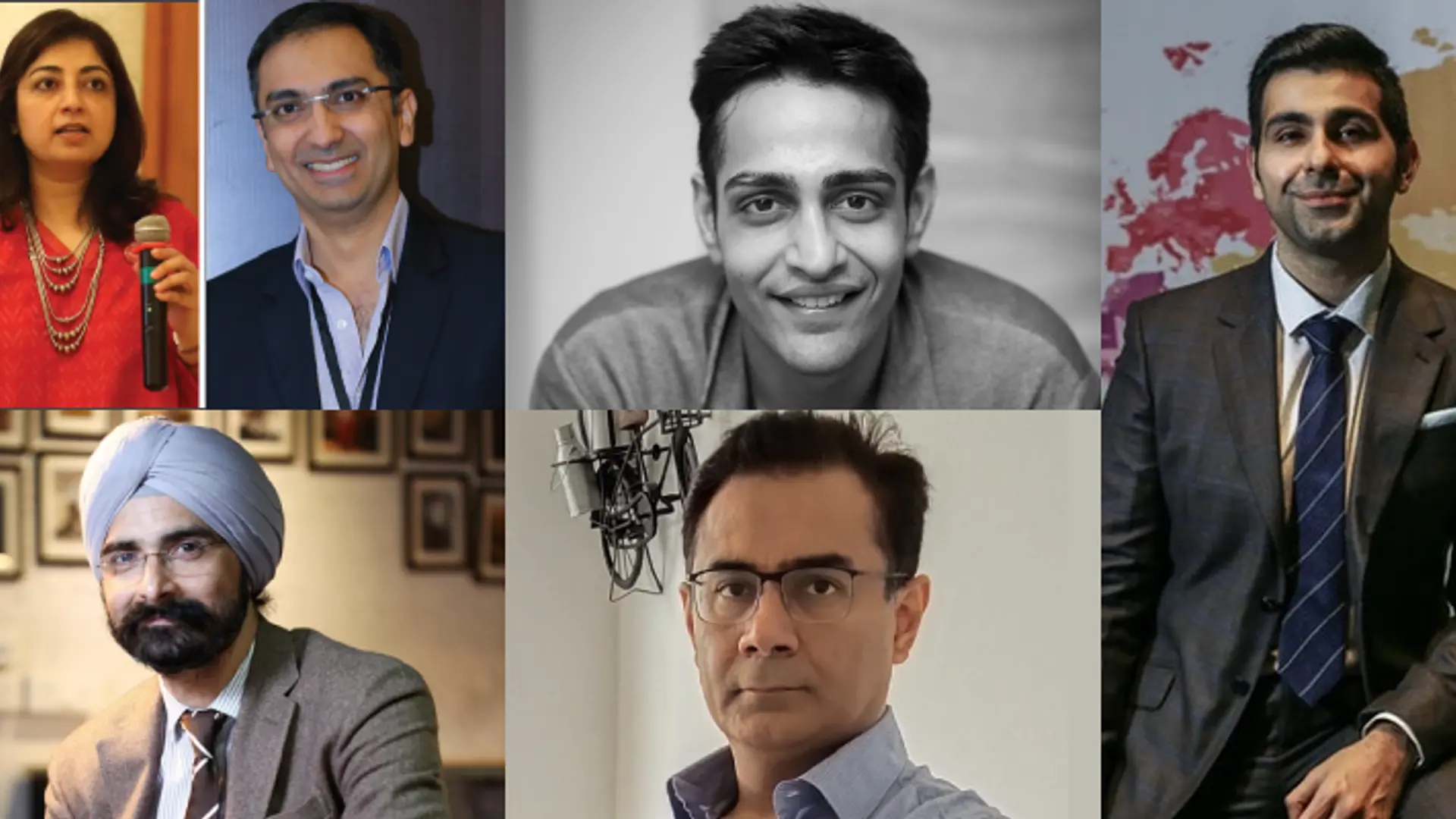Started as an experiment in parenting, Red Earth Resorts is helping build sustainable communities
What do you do when your child, midway through college, turns around and says that they wouldn’t want to go on? What if they say that formal education is not the path for them to tread upon, and they want to make a mark in the hospitality industry as an entrepreneur instead? You succumb, keeping their future in mind, and let them follow their calling.
That’s what Ravi Parameswaran (59) and his wife Rachel Ravi (49) did when their son Aditya, then all of 19, decided to passionately pursue his dream of being an entrepreneur.

Ravi Parameswaran and his wife Rachel Ravi
On dealing with his unusual decision to quit education, Rachel says, “I was in a dilemma as to what to do with a child who says he wouldn’t go on with formal education. Education is geared towards a livelihood but if you can find your feet well before that, then why not? Formal education is certainly beneficial but it’s not for everyone.”
Thus, the couple established Red Earth Resorts in Kabini in 2012 that served as a training camp for Aditya, now 27, who would learn the nuances of hospitality and earn his place in the industry by working hard as any other employee. “He got nothing on a silver platter. He’s earned what’s rightfully his by working hard,” Rachel insists.
Aditya’s training also included one-and-a-half years of being mentored by Chef Manu Chandra of Olive Beach in Bengaluru, four months as a teacher at a tribal school in BR Hills and a couple of years as an intern with a hotelier friend in Rajasthan.
Ravi says that while contemplating about creating a space with affordable comfort, the final nudge to dive into the project came from a friend—Australian Dick Knight, who had a dive resort in the islands of Papua New Guinea (where the couple lived for a decade), who was travelling around India. “He had experienced our hospitality in our home at Papua New Guinea. He felt the same warmth and hospitality missing at hotels in India where he stayed. He suggested we venture into hospitality,” he says.
The couple tested the waters with a unique offering called ‘Grassroots in Wayanad’ in 2010 with just five luxury Swiss tents aimed at providing personalised holidays for guests. Red Earth in Kabini was next in line, followed by two more resorts—in Tadoba in 2018 and Gokarna in 2019.
The Red Earth Resorts posted a turnover of Rs 6.5 crore in 2018. With an initial investment of Rs 7 crore and a bank loan, they claim to have broken even in less than three years. The couple adds that they managed to pay back the loan in four years.
Spread over 10 acres with just 20 cottages, every detail of the property has been designed for sustainable tourism. The resort has been built with soil from the land it stands on through a technique called rammed earth construction.
The cottage roofs have been built with bamboo mats made by the tribals of Wayanad and elephant grass by elderly craftsmen of Tamil Nadu. The floor tiles are handmade glass tiles.
But what truly sets the ethos of Red Earth apart is their commitment to sustainable development of the local communities.
Not only do they employ the local tribes but they also support a school for tribal children in the locality.
Ravi admits that they were initially apprehensive about employing local hands due to the sheer amount of work involved in training them. “Later, it turned out to be a good move,” he says, adding, “The locals also enjoyed being a part of the venture as it automatically elevated their status in the society.”

Ravi and Rachel with Aditya (sitting) and the team.
He says older women, in particular, benefitted a lot from the decision. From housewives doing ordinary chores, they turned into breadwinners, which brought them much respect and recognition. “Young men from these communities, who had migrated to cities looking for jobs but came back disillusioned, were another lot that benefitted from our decision. They got to do decent jobs and earn a good salary on their own land,” Ravi says.
But as he had predicted, this also turned out to be their biggest challenge. Rachel explains, “Training the staff was a big challenge. They didn’t get the concept of a uniform, coming to work on time, and being present every day. People would just take off without a warning.”
Ravi adds that another big learning curve for them was the understanding that the markets are connected. Be it a natural calamity like the recent Kerala floods or an economic shakeup like a recession in the US, issues can adversely affect the business, he says.
From his experience of running a successful hospitality chain, Ravi is certain that this is not a business that you can run remotely. It needs constant monitoring and upgrades. “Guests expect to see things improving and not going down. Unless you’re willing to be directly involved in the business, do not start it,” he says.
Another area that needs attention and care is employee satisfaction. Employees look for growth, and opportunities need to be created for them. “Some of our naturalists started as security guards. One of our earlier liaison workers is now the GM of our Gokarna property,” Ravi states.
If repeat customers, some even five times, are anything to go by, all this care and attention to detail have not gone to waste. Another positive outcome is a very settled staff with almost zero attrition and absenteeism.
Taking a cue from this success, Ravi says their aim is to create a property every two years. He adds,
“I want to see the company listed ultimately. That’s the only way shareholders will find a value for their investment.”
Talking about the future of the MSME market in India, Ravi says that despite some successful businesses, funding is a big problem plaguing the market. Many sops offered for big multinational companies or IT companies are not extended towards these small companies.

The interiors of a cottage at the resort.
“I paid commercial value for every inch of land that I procured. Procedures to start a business are still cumbersome. It took one-and-a-half years for the paperwork to be completed for the Kabini property. Six years later, it took the same amount of time for the paperwork for the Tadoba project in Maharashtra. It’s tedious to break as a first-generation entrepreneur unless it’s in the tech sector,” he says, adding,
“If at all the nation has to progress, development has to happen in the tier II cities and in the hinterland. The businesses in these places have to be supported.”







